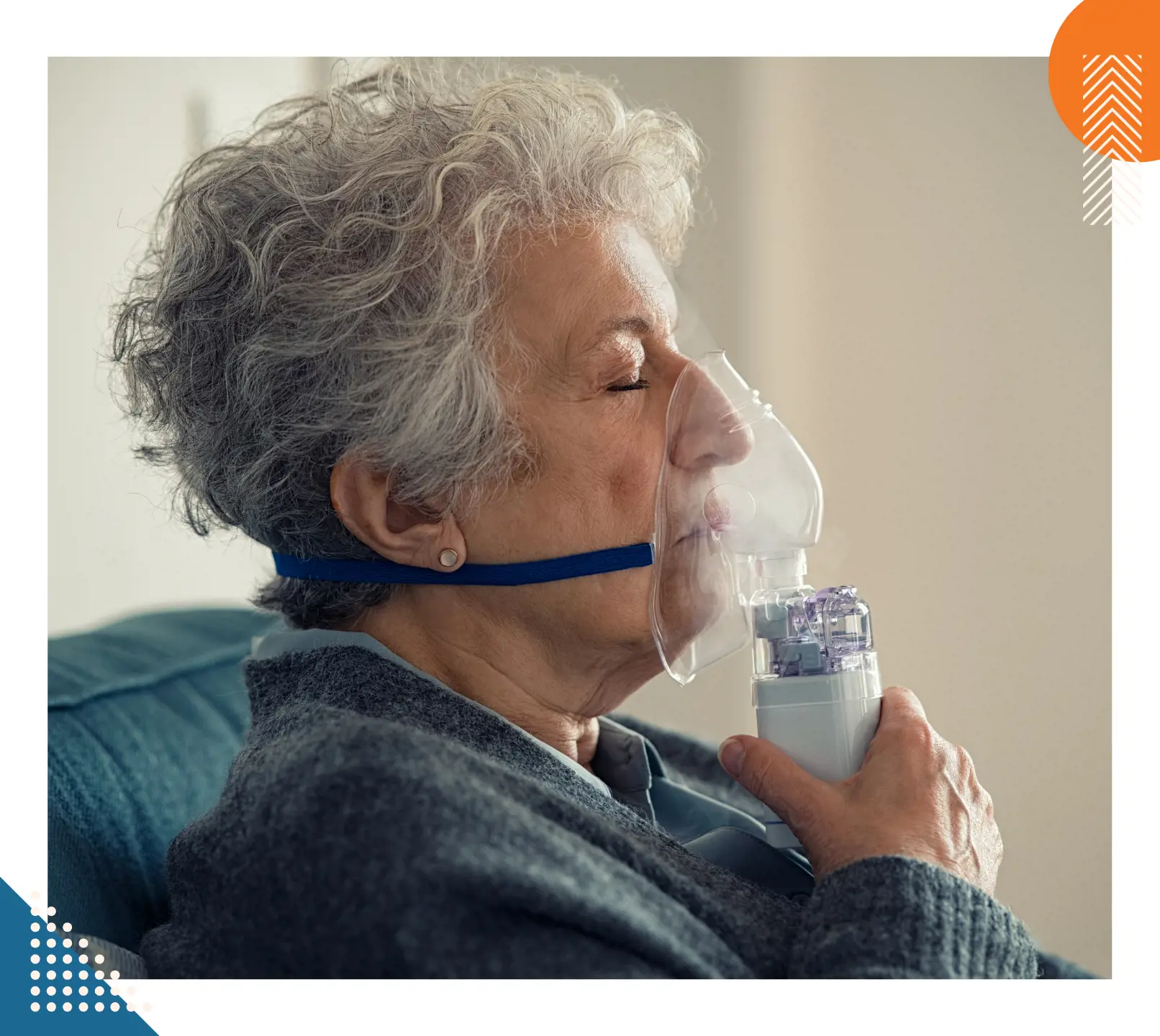Asthma in Adults & Adult on-set asthma: Causes, Symptoms, and Management
Asthma isn’t just a childhood condition, many adults continue to live with it, and some experience it for the first time later in life. Adult-onset asthma can significantly impact daily activities, work, and overall quality of life if not properly managed.
Understanding the causes, symptoms, and available treatments is essential for keeping asthma under control and preventing flare-ups. This article explains what adult asthma is, why it can develop later in life, how to recognise its symptoms, and the steps you can take to manage it effectively.
Understanding Adult Asthma
What is Adult Asthma or Adult on-set asthma?
This refers to asthma that develops after the age of 20. It occurs when the airways become inflamed and narrowed, causing breathing difficulties. Symptoms often include coughing, wheezing, chest tightness, and shortness of breath.
Unlike childhood asthma, which may improve or disappear with age, adult-onset asthma is more likely to persist and require long-term treatment. Factors such as hormonal changes, respiratory infections, or exposure to environmental irritants may trigger it.
In Australia, asthma affects about 1 in 9 people, and adults represent a significant portion of those diagnosed. Managing adult asthma involves identifying triggers, using prescribed medications correctly, and maintaining regular follow-ups with a healthcare provider.
Can You Develop Asthma as an Adult?
Yes, it is possible to develop asthma later in life, even without any childhood history of the condition. It can be triggered by several factors, including ongoing exposure to irritants, underlying allergies, or lifestyle and health changes.
Common risk factors and triggers include:
-
Respiratory infections (like cold or flu)
-
Workplace exposure to chemicals, dust, or fumes
-
Allergens such as pollen, pets, or mould
-
Hormonal changes, especially in women
-
Smoking or exposure to second-hand smoke
-
Weight gain or untreated reflux (GORD)
Causes and Triggers of Adult Asthma
Causes of Adult Asthma
The causes of adult-onset asthma are complex and can vary from person to person. For some, asthma may run in the family, while others develop it due to ongoing exposure to environmental irritants or changes in health and lifestyle.
Common causes include:
-
Genetic predisposition: A family history of asthma, eczema, or allergies increases the likelihood of developing asthma.
-
Environmental exposure: Long-term contact with allergens, chemicals, or pollutants can inflame the airways.
-
Hormonal changes: Women may develop asthma during pregnancy or menopause.
-
Respiratory illnesses: Severe viral infections can lead to inflammation that triggers asthma symptoms.
-
Lifestyle factors: Smoking, obesity, and poor air quality can contribute to adult-onset asthma.
Common Triggers
Asthma symptoms often flare up when exposed to certain triggers that irritate the lungs and airways. Recognising and avoiding these triggers can greatly reduce the frequency and severity of asthma attacks.
Common asthma triggers include:
-
Allergens: Pollen, dust mites, mould, and animal dander
-
Air pollution: Smoke, strong fumes, or vehicle exhaust
-
Respiratory infections: Colds, flu, or sinus infections
-
Exercise: Especially in cold or dry air
-
Weather changes: Sudden temperature shifts or humid conditions
-
Occupational exposures: Dust, cleaning chemicals, composite woods, or industrial fumes
-
Smoking: Active or passive smoke exposure is a leading trigger for adults
Symptoms of Adult Asthma
Common Symptoms
Adult asthma symptoms can differ from childhood asthma and may be more persistent. Some adults experience ongoing coughing or breathlessness, which can easily be mistaken for another condition such as a lingering cold.
Common symptoms include:
-
Wheezing: A whistling or squeaky sound when breathing
-
Shortness of breath: Especially during physical activity or at night
-
Chest tightness or pressure: Feeling like it’s harder to breathe in deeply
-
Persistent coughing: Often worse at night, early morning, or after exercise
Severity of Symptoms
Asthma symptoms can range from mild to severe and may change over time. For some adults, symptoms appear only during exercise or exposure to triggers, while others may experience ongoing breathing difficulties that impact daily activities.
-
Mild symptoms may cause occasional wheezing or coughing, easily managed with reliever medication.
-
Moderate symptoms might require regular use of preventer medication to maintain control.
-
Severe asthma can lead to frequent attacks, hospital visits, or difficulty performing normal tasks.
Uncontrolled asthma can affect sleep, concentration, and physical health. Monitoring your symptoms and following a treatment plan helps maintain good asthma control and prevents serious flare-ups.
Diagnosing Adult Asthma
Medical History and Physical Exam
During your initial consultation, the GP or respiratory specialist will take a detailed medical history, including:
-
Onset and frequency of symptoms (wheezing, coughing, shortness of breath)
-
Possible triggers, such as allergens, exercise, or workplace exposures
-
Personal or family history of asthma, allergies, or other respiratory conditions
The physical exam involves listening to your lungs with a stethoscope for wheezing or other abnormal sounds. The doctor may also check oxygen levels and overall respiratory function. This assessment helps distinguish asthma from other conditions, such as chronic obstructive pulmonary disease (COPD) or heart-related issues.
Diagnostic Tests
Several tests help confirm adult asthma:
-
Spirometry: Measures how much air you can inhale and exhale, and how quickly. Reduced airflow may indicate asthma.
-
Peak flow measurement: Tracks how fast you can blow air out of your lungs. Fluctuations can signal airway narrowing.
-
Bronchoprovocation challenge (e.g., mannitol, saline, metacholine): Tests airway hyper-responsiveness if spirometry results are not diagnostic but asthma is still suspected
When to See a Doctor for Adult Asthma
Consulting a GP is crucial if you notice symptoms like persistent coughing, wheezing, chest tightness, or shortness of breath. Early assessment allows for proper diagnosis and timely treatment, reducing the risk of severe asthma attacks and complications.
Seek medical advice if you experience:
-
Frequent coughing, especially at night or early morning
-
Wheezing or shortness of breath during routine activities
-
Symptoms triggered by exercise, allergens, or workplace exposures
-
A sudden worsening of previously mild asthma
During your consultation, the GP will review your medical history, perform a physical examination, and may recommend diagnostic tests such as spirometry. This process helps create a personalised asthma management plan tailored to your needs.
Medication and treatment for Adult Asthma
Adult asthma treatment typically involves a combination of reliever and preventer medications:
-
Reliever medications (short-acting beta agonists): Provide fast relief during asthma attacks by relaxing the airways. These are used as needed.
-
Long-acting relievers (long-acting beta agonists): Help keep airways open for longer periods, often combined with preventers.
-
Preventer medications (inhaled corticosteroids): Reduce inflammation in the airways, taken daily to prevent symptoms and attacks.
Other treatments may include leukotriene receptor antagonists, biologics, or allergy therapies for specific cases. Correct inhaler technique and adherence to prescribed doses are essential for effectiveness. Regular follow-ups ensure medications are working and adjustments can be made based on symptom control.
Managing Adult Asthma
Importance of Good Asthma Control
Good asthma control is crucial for adults because it reduces the risk of severe attacks, hospitalisation, and long-term lung damage. Proper management allows adults to maintain normal physical activity, sleep well, and avoid disruptions to work or social life.
Effective control also lowers the impact of triggers, prevents inflammation from worsening, and reduces reliance on emergency medications. Adults who consistently follow their asthma management plan experience fewer symptoms and enjoy a better quality of life overall.
What Good Asthma Control Looks Like for Adults
Well-controlled asthma means:
-
Minimal or no daytime symptoms
-
Rare need for reliever medication
-
No night-time awakenings due to asthma
-
Ability to exercise and carry out daily activities without limitations
Monitoring symptoms and peak flow readings helps determine whether asthma is well-managed. Adults with controlled asthma experience fewer flare-ups and can focus on daily life rather than managing symptoms constantly.
Preventive Strategies
Preventing asthma symptoms is as important as treating them. Key strategies include:
-
Avoid known triggers and allergens: Identify and minimise exposure to pollen, dust, mould, pets, or workplace irritants
-
Maintain a healthy lifestyle: Regular exercise, balanced diet, and healthy weight support lung function
-
Keep your home clean: Reduce dust, vacuum regularly, and control indoor humidity to prevent mould
-
Manage stress and emotional well-being: Stress can trigger symptoms; mindfulness, relaxation techniques, and adequate sleep help
These strategies work best alongside prescribed medications and regular medical reviews.
Creating an Asthma Action Plan
A personalised asthma action plan helps adults manage symptoms, recognise warning signs, and respond to flare-ups promptly. Developed with a GP or respiratory specialist, it outlines:
-
Daily management routines
-
Medication schedules
-
Steps to take during worsening symptoms or an attack
Regularly updating the plan ensures it remains effective as your condition or lifestyle changes.
Regular Asthma Reviews with Your Doctor
Regular asthma reviews are essential for monitoring control and preventing complications. During a review, your healthcare provider will:
-
Check inhaler technique to ensure proper medication delivery
-
Assess symptom control and frequency of reliever use
-
Update your asthma action plan if needed
-
Discuss any new triggers or lifestyle changes
What to Do During an Asthma Attack
During an asthma attack, quick and calm action is essential:
-
Follow your asthma action plan - use your reliever inhaler as prescribed.
-
Sit upright and try to stay calm to help your breathing.
-
Take slow, steady breaths and repeat the reliever dose if symptoms persist.
-
Seek emergency help (call 000 in Australia) if:
-
Symptoms do not improve after 5–10 minutes
-
You have difficulty speaking or severe breathlessness
-
Lips or face turn blue
Special Considerations for Adult Asthma
The Use of a Spacer Regardless of Age
Using a spacer with your inhaler significantly improves medication delivery to the lungs. Studies show up to 90% of people don’t use their inhalers correctly, reducing effectiveness.
How to use a spacer correctly:
-
Shake the inhaler and attach it to the spacer
-
Breathe out fully, then seal your lips around the spacer mouthpiece
-
Press the inhaler once and inhale slowly over 3–5 seconds
-
Hold your breath for 10 seconds before exhaling
Spacers are especially helpful for adults with poor inhaler technique, arthritis, or coordination difficulties, ensuring the medication reaches the lungs efficiently.
Cigarette Smoke as a Core Trigger
Cigarette smoke is a major asthma trigger for adults. Both active smoking and exposure to second-hand smoke can worsen symptoms, cause flare-ups, and reduce the effectiveness of medications.
Quitting smoking is crucial for managing asthma. Strategies include:
-
Seeking support from a GP or smoking cessation services
-
Using nicotine replacement therapy or medications if appropriate
-
Avoiding environments with smoke exposure
Reducing smoke exposure improves lung function and lowers the risk of severe asthma attacks.
Occupational Asthma and Its Link to Adult-Onset Asthma
Occupational asthma develops from exposure to irritants at work, such as dust, chemicals, or fumes. It often contributes to adult-onset asthma, particularly in industrial, healthcare, or cleaning environments.
Management strategies include:
-
Identifying and minimising exposure to triggers
-
Using protective equipment like masks or ventilation systems
-
Consulting a healthcare provider for personalised treatment
Complications of Untreated Asthma in Adults
Potential Health Complications
Untreated or poorly managed asthma can lead to serious health issues. Chronic inflammation and frequent flare-ups may increase the risk of respiratory infections such as bronchitis or pneumonia. Over time, repeated airway damage can reduce lung function and cause irreversible lung scarring.
Other potential complications include increased likelihood of hospital admissions, sleep disturbances, and reliance on emergency medications. Adults with uncontrolled asthma are more vulnerable to severe attacks, which can be life-threatening if not treated promptly. Early diagnosis and consistent management are essential to reduce these risks and maintain long-term lung health.
Impact on Quality of Life
Uncontrolled asthma affects more than just physical health. Persistent symptoms can disrupt daily routines, limit participation in exercise or work, and interfere with sleep. Emotional wellbeing may also be affected, causing stress, anxiety, or frustration. Social activities can become restricted due to fear of flare-ups, reducing overall life satisfaction.
By managing asthma effectively, adults can maintain independence, engage fully in daily and social activities, and experience improved mental and physical wellbeing. Regular reviews, adherence to medications, and preventive strategies are key to achieving a better quality of life.
See a GP about your Adult Asthma Symptoms today
If you are experiencing ongoing coughing, wheezing, shortness of breath, or chest tightness, book an appointment with a Myhealth GP today. Early assessment and personalised management can help control symptoms, prevent complications, and allow you to maintain a full, active lifestyle.
Don’t wait until symptoms worsen, timely medical advice is important for long-term respiratory health.
Helpful Links:
-
Asthma Australia. Diagnosing Asthma. Available at: https://asthma.org.au/about-asthma/diagnosis/
-
Asthma Australia. Managing Asthma. Available at: https://asthma.org.au/about-asthma/management/
-
National Asthma Council Australia. Asthma Management Handbook. Available at: https://www.nationalasthma.org.au/
-
Healthdirect Australia. Asthma in Adults. Available at: https://www.healthdirect.gov.au/asthma
-
Healthdirect Australia. Asthma Symptoms and Triggers. Available at: https://www.healthdirect.gov.au/asthma
-
National Asthma Council Australia. Asthma and Triggers. Available at: https://www.nationalasthma.org.au/
-
National Asthma Council Australia. Occupational Asthma. Available at: https://www.nationalasthma.org.au/
-
Asthma Australia. Asthma Medications: Relievers and Preventers. Available at: https://asthma.org.au/about-asthma/medications/
-
Healthdirect Australia. Asthma Treatments and Inhalers. Available at: https://www.healthdirect.gov.au/asthma
-
World Health Organization (WHO). Influenza and Respiratory Health. Available at: https://www.who.int/news-room/spotlight/influenza-are-we-ready/zoonotic-influenza

















































